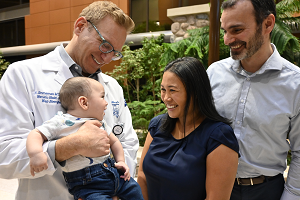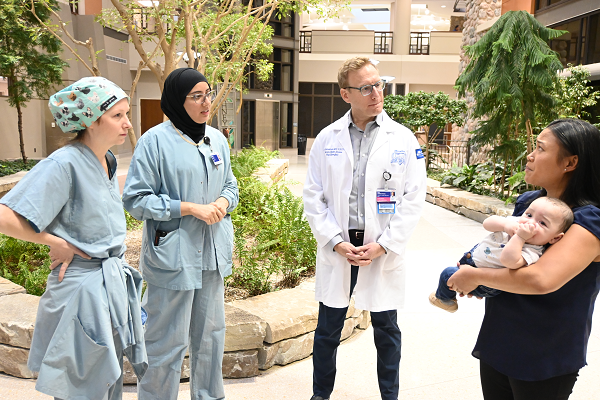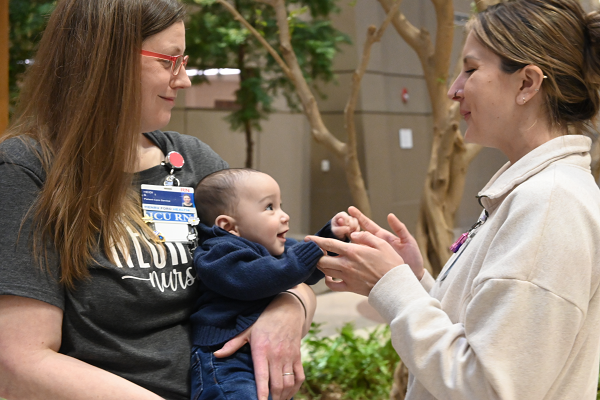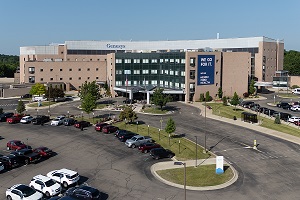Farmington Hills Mom Survives Rare, Deadly Pregnancy Complication

WEST BLOOMFIELD – Maris Efrusy describes herself as a “basic mom” who loves pumpkin spice Frappuccino and being home with her husband, Nathan, and their two young kids – Etta and Sammy and her two bonus stepsons.
Giving birth to Sammy was anything but basic.
At first, everything was normal. Maris went to Henry Ford West Bloomfield Hospital on June 12, expecting to give birth via Cesarean Section. She wasn’t nervous. She’d given birth via C-Section before.
Samuel James Glover Efrusy was born as planned at 9:45 a.m. weighing 7-pounds, 10 ounces and measuring 20-inches long. Nathan showed Maris a photo of her baby boy immediately after he was removed from the womb.
“I felt really calm. I joked about Sammy’s funny ears being all squished up,” Maris said. “And then I coded.”
Less than 30 seconds after Sammy Efrusy came into this world – his mother nearly left it.
“It started off as a routine case. Baby came out baby was crying,” said Neil S. Simmerman, M.D., Maris’ obstetrician and gynecologist and service chief for Women’s Health at Henry Ford West Bloomfield Hospital. “But then Maris started saying she wasn’t feeling very well,’ and, the next thing we knew, her heart stopped.”
Maris was suffering an amniotic fluid embolism (AFE). The National Institutes of Health describes AFE as “one of the most catastrophic complications of pregnancy.” The rare event impacts 1 in 40,000 births each year in North America. The mortality rate is as high as 80 percent.
 “The amount of knowledge in that room consisted cumulatively of hundreds of years of experience in medicine, yet none of us had seen this before,” Simmerman said of the team of more than 25 doctors, nurses and other professionals who ultimately provide Maris with life-saving care in the hours following the birth of Sammy and into the next several days.
“The amount of knowledge in that room consisted cumulatively of hundreds of years of experience in medicine, yet none of us had seen this before,” Simmerman said of the team of more than 25 doctors, nurses and other professionals who ultimately provide Maris with life-saving care in the hours following the birth of Sammy and into the next several days.
AFE is characterized by two things, Simmerman said, “Patients suffer from sudden cardiopulmonary collapse, and have an inability to stop bleeding.”
The team went into life-saving mode.
Maris was intubated. A nurse immediately started CPR. A code team of nurses and doctors was called in. They took turns doing chest compressions to ensure Maris continued to have fresh hands pumping blood to her heart.
A brain without oxygen dies in nine minutes, but it doesn’t go out like a light. The heart, lungs, and other organs gradually falter and stop, so seconds matter. Maris’ life-saving CPR would continue for more than 30 minutes.
“The odds of getting a pulse back in this situation were 50-50. It was one of those rare, once-in-a-career type events that you hope you never have,” Simmerman said.
At the same time, Maris was bleeding so heavily Simmerman’s labor and delivery team had to perform an emergency hysterectomy.
Non-emergency surgeries were put on hold in the Main Operating room, so that every available person from the labor and delivery team, the hospital’s code team, anesthesiologists and others could work to save Maris’ life. Even the hospital’s blood bank worked round the clock to get blood to Maris.
The resources available at Henry Ford West Bloomfield Hospital and the expertise of the medical professionals were vital in saving Maris, Simmerman said.
 The exact cause of AFE is unknown. Just before, during, or immediately after delivery, amniotic fluid enters the bloodstream of the person giving birth. In most women, there is no reaction; but some experience a severe allergic response.
The exact cause of AFE is unknown. Just before, during, or immediately after delivery, amniotic fluid enters the bloodstream of the person giving birth. In most women, there is no reaction; but some experience a severe allergic response.
“The fact that our team recognized it and not only sprang into action, but provided high quality care, high quality CPR and were able to get that many resources together that quickly – was nothing short of amazing. It went beyond the people in the room , but the people in the lab, in the blood bank – they were all instrumental in this case – and it goes well beyond the 25 of us that were in that room or the one person doing chest compressions at a time. This wasn't a band; this was a symphony. This was a massive orchestra of people that were all playing perfectly to give Maris a chance,” Simmerman said.
The initial prognosis was grim.
Maris’ husband, Nathan, faced the reality that his whole world might turn upside down.
“I was definitely starting to think about what would happen if she doesn’t make it. I’d have two babies by myself and my two younger kids,” Nathan said. “I just had to put faith in God and these doctors. They were really good coming back and keeping me in the loop. I didn’t even know if she was going to pull out of it. I was expecting the worst.”
Simmerman also was concerned.
“When we got her into the ICU, frankly, none of us knew if she would live through the night. I spent that first night in the hospital and checked on her every two hours,” he said. “Despite having survived the initial episode, we all knew that statistically, the likelihood of her returning to normal brain function was very, low.”
But then the next morning at 6 a.m., Maris’ eyes opened, she started having some reflexes and doctors realized her brain was functioning. Simmerman credits immediate CPR and the team’s quick and comprehensive response.
“I think the way everything happened that morning was serendipitous. One of the reasons this is such a devastating disease is the number of resources it takes to support a patient that is getting that sick that quickly in that amount of organ systems,” Simmerman said. “Getting one small victory after another that day – only later on did I realize the grand slam that we hit and what an amazing feat we witnessed.”
Maris doesn’t remember any of the initial trauma. While the first four or five of the 11 days she spent in the intensive care unit were foggy because of the medicine she was on, too, she says her care team left an impression.
Intubated and with ribs that were crushed because of the CPR, it was hard for Maris to communicate. She had pneumonia, a collapsed lung, bladder issues and needed dialysis.
“They were so well trained. Very much like a machine. They really knew the protocols they had in place," she said. “I really believe if I was at a different hospital – I wouldn’t be here talking to you today. It was really a miracle.”
In addition to life-saving measures, Maris says the ICU team went above and beyond to make her comfortable by playing her favorite music during especially uncomfortable procedures; chatting with her during a middle-of-the-night shower and day-time hair-washing sessions; and making it possible to celebrate Nathan’s birthday by throwing a small bedside party. The staff also integrated daily visits with Sammy during daytime visiting hours. And at the end of the hospital, staff arranged for the entire family to be together during Maris’ last three nights at the hospital.
“They really were what got me through it. I was a stay-at-home mom and I couldn’t be with my toddler or my newborn,” Maris said. “I know they were busy, but they would take 10 minutes to talk to me. To hold my hand. I was so grateful.”
By the end of her stay, Maris says the Henry Ford team felt like family.
“This is the kind of stuff you see on a Netflix series. You’ll find stories of women who do survive AFE, and they don’t come back as themselves or they have to relearn to do everything,” Maris said. “I have so much gratitude for the staff. I’m not really anyone special. The treatment I got at Henry Ford – they treated me like family. They treated me as if this was their own daughter or sister that needed this kind of care.”
###
MEDIA CONTACT: mediarelations@hfhs.org
.svg?iar=0&hash=F6049510E33E4E6D8196C26CCC0A64A4)

/hfh-logo-main--white.svg?iar=0&hash=ED491CBFADFB7670FAE94559C98D7798)






